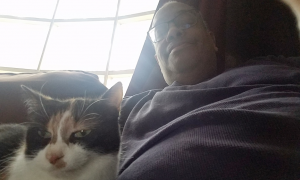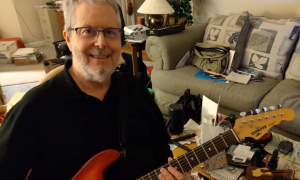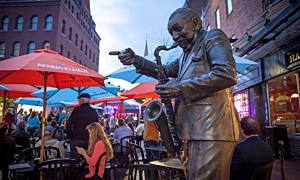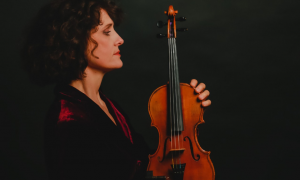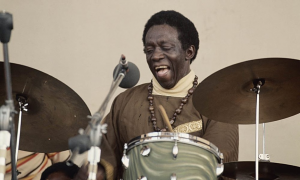Home » Jazz Articles » Meet the Staff » Meet Marc Cohn
Meet Marc Cohn

Meet Marc A. Cohn
Dr. Cohn is a New Yorker-in-exile and has been doing jazz radio as an avocation since 1967. He is Professor Emeritus in Seed Biology at Louisiana State University, where he has won numerous teaching awards. He is a widely recognized authority on seed dormancy, is Editor Emeritus of Seed Science Research (the premier scientific journal in the field), and is a recipient of the Seed Science Award (nationally, the most prestigious research award in seed biology) from the Crop Science Society of America.What is your first-ever radio-related memory?
As a pre-teen listener, hearing pop tunes on WMCA and WABC, listening to classical music on WQXR, Jean Shepherd monologues on WOR, and discovering Ed Beach on WRVR.How did your fascination with radio start?
From the above listening. The really great DJs made you feel like they were talking to you, personally—not talking to the walls.What radio shows were a fan of, and why?
Lloyd Moss on WQXR (who was a "closet" jazz fan); Jean Shepherd on WOR; Dan Ingram on WABC; 'Uncle Ed,' Billy Taylor, Del Shields, Alan Grant for the above reasons. And they played good music for their respective genres. You could have a good time AND learn something.When did your jazz radio career start?
Freshman year in college. One of my dorm-mates had a pirate radio station in his room with a microphone and one turntable. You had to chatter while changing records. "Real" radio started shortly thereafter on WNEU in Boston.Did you have a mentor or you are a self-made host?
All those guys, mentioned above, were my long-distance mentors. I internalized what they were doing versus your run-of-the-mill DJs. I didn't have in-person mentoring. I learned by listening back to "break-tapes" of my own shows, which patter-wise were initially pretty weak (I'm being polite here). When you hear yourself doing/saying dumb things, first you want to hide and then you get mad and figure out how to fix them.Do you recall the first album/song you ever presented on the radio?
From real radio, indeed: "Midnight Special" by Jimmy Smith. It was the theme of my show, which started at midnight.What stations have you worked for?
WNEU/WRBB (Boston), WVBR (Ithaca, NY), WTJU (Charlottesville), WLSU/WPRG/KLSU (Louisiana State University), WRKF (Baton Rouge) and presently WHYR. All volunteer, except for one summer in Ithaca where I got paid to do a Saturday afternoon "top-40" soul show.How do you approach each episode?
This could take a while. Here's the time structure. On WHYR, the show is two hours (although I've done shows as long as five hours in the past including progressive rock, R&B, ambient and an occasional country music show). There are four segments that need to time out to 28'56" each due to network syndication considerations. A VERY important idea one needs to consider today, with the vast amount of competing media, is 'why should someone listen to me play music that almost anyone can play for themselves at any time?" When local radio or one's personal collection were the only jazz sources, that was an important question but not the critically vital question. So, I've constructed a general 'format': 25% 21st century music and 75% classics, going all the way back to the 1920s. I have a spreadsheet with over 100 major players from the history of jazz, as well as some underserved players. I keep track of when, what and who I've played. You've got young people today who don't know who Count Basie is! Everyone else is doing 'what's new/hot.' And maybe it's new, but most of it isn't all that hot.G&M has two special shows each month: 50th anniversary celebrations of Blue Note recordings and birthday salutes. Other shows feature various ideas I get from the jazz press, jazz literature (I'm reading and rereading constantly), and records of note, as well as the major centennial celebrations and multi-week, chronological career retrospectives (We're in the midst of surveying Sonny Rollins. In the past we've done Bird, Trane and Horace Silver). And then there are those times when you're listening to one track (old or new), the light goes on in your head, and a set or segment jumps out. We also do various compare and contrast segments to illustrate different approaches to the same tune. Our R&B versus jazz version C&C is VERY popular.
Then, there's how the songs flow/fit together. I don't do sets longer than three tracks anymore—how can a listener remember the third song in a five-song set? I spend a lot of time deciding which tracks to play. The main criteria generally: is the melody/track memorable and does it have the right groove. I allocate about two minutes/segment for talk, which is mostly running down what you heard and who's playing. In past iterations of the show, I've talked a lot more (remember, I'm a real professor and without some discipline, I talk like one). But that was back in the day when the DJ was the primary source of information. Today, you give the listeners the essential points and they can further explore to their hearts' content on the Web. I'm just the guide by the side.
How long does it take you to produce a show?
My obsessive time management software tells me the number is 30 hours/show.Are you a Vinyl, CDs, or Files host?
All of the above.What is it that usually impresses you about a musician?
Let's try the short version. Do they have something to say? Do they have a distinctive sound (for a listener, not another musician)? Are the tunes played distinctive and memorable? I have a line that I use when I train scientists: Just because you can type 140 words/minute doesn't mean you have anything to say. In other words, exceptional technique is essential, but it's just the baseline. That's a real issue today to my ears.How do you engage with your audience?
You talk TO your listeners, not AT them (I visualize faces on the wall behind the console). Most people reading off scripts sound like they're reading. Within the requirements of doing radio, make them feel like they're sitting with you in the house listening. From your tone/attitude make sure that the listener feels that you are absolutely THRILLED to be sharing the time with them. If you are bored with your show, your audience was bored 10-minutes before you were! Fortunately, I have Ms. Natalie Caruso from WHYR to take care of the social media promotion.Do you have a sense of who is listening to your show?
Teenagers, young adults, grandparents, various dogs and cats all over the world. When I did a night-time show just locally, I'd have young people come up to me at gigs I was mc'ing and tell me they listened to the show under the covers in bed, late at night, just like I did at their age. Or waiters at restaurants would recognize my voice and tell me that they got into jazz as youngsters because of my show. G&M is programmed for the casual listener who wants to get more into the deep end, although a lot of musicians tune in and enjoy the show. Most shows can be enjoyed either in the background or in your face.How do you feel about "airwave radio" vs. "internet radio"?
Good radio is good radio. But like every other medium, there's a lot of vin ordinaire out there, which makes it challenging to discover/recognize the good stuff for the average listener. Streaming jazz sites (without a DJ talking) become lifestyle accessories or aural wallpaper, i.e. background music. Hopefully, at least the musicians are getting some royalties.If you were programming your final radio show, which songs would you open and close with?
Start: "Midnight Special" by Jimmy Smith. End: "The Journey Home" by Keith Jarrett.Do you listen to other jazz radio shows? If so, which ones do you enjoy most?
Well, I skip around a lot. From the AAJ stable, I usually listen to Mondo Jazz and Jazz At 100 every week and sample a few others. I'll dip into WBGO in metro New York and Jazz FM out of London (Ruth Fisher & Chris Philips, mostly) to check out the competition, so to speak, and to hear the flavor of the month.Can you share a funny episode that happened during your radio career?
Here's two.- In Boston for orientation week, we had an RV in the quad at Northeastern, broadcasting live on the air and loudly in the quad from 8AM. I had the morning drive slot several times. An elderly woman who lived across the street brought the AM shift coffee and pastries for whatever reason. We became friendly and I asked if she had a request (remember this is a free-form college station). "Well, could you play some Wagner for me at eight?" So, the next day, out of the top-of-the-hour news break, a segment of Back Bay reverberated with "The Ride of the Valkyries." She was thrilled!
- I'm doing my 9PM-1AM Saturday night jazz show in Ithaca. Robert Klein (the comedian) was in town for an alumni fundraiser. They've got Dr. Jazz on the radio driving back to the hotel. Could they make a detour to stop by the station? So, in walks Robert, we chat, I do a break, etc. Then he tells me that one of his long-time dreams is to be a jazz DJ on the radio. And for the next hour, with yours' truly engineering, he picks the records, does all the talking and we made a celebrity VERY happy (and he had very hip taste, BTW).
What is your favorite song to whistle or sing in the shower?
No music in the shower; that's quiet time.If you could have dinner with anyone from jazz history, who would it be and why?
Well, Buddy Bolden and King Oliver, just for a start. If you have to ask why, you'll never know....What underrated disc do you wish everyone knew about?
Oh, where do I begin. Rodney Kendrick (Dance, World, Dance & Last Chance For Common Sense (Verve); Bennie Wallace (The Talk Of The Town (Enja); an Eddie Harris LP on Angelaco (Sounds Incredible—don't know if this was ever on CD); Houston Person (Soul Dance (Prestige); Ray Anderson (Where Home Is (Enja); Arnett Cobb (Smooth Sailing (Prestige); Marty Ehrlich (New York Child (Enja); Hines/Grappelli on Black Lion; all of the Ralph Peterson Fo'tet records on Blue Note; any solo Jessica Williams or Dave McKenna discs you can find. That's just off the top of my head.How would you describe the state of jazz today?
That's a nasty question. I can only speak about recordings. More of the recorded history is accessible today than ever before. So, hearing/seeing the music on the web is easier than ever. There's more new music available at the highest technical level than I've heard in my lifetime. HOWEVER, very little is memorable, whether it's avant-garde or contemporary. I can hardly tell one young tenor player from another. The writing may be sophisticated technically, but if you can't whistle the tune when you walk down the street, it's forgotten. What was it that Bu said? Music should wash away the cares of everyday life? Not happening for many 21st century releases. Sometimes, I have to stop screening new releases because I feel the darkness descending on my state of mind. I could ramble on about this, but that's the short story. We don't get enough live touring groups playing locally, and when we do, the shows are mostly half-filled. Hopefully, the state of live jazz is better elsewhere (pre-and post-COVID); I can't say.What are some of the essential requirements to keep jazz alive and growing?
- Children and young people need to hear this music in grade school, especially in live performance.
- Every college/university needs to have a jazz appreciation general elective course (at the novice listener level) [I know at least one major state flagship university that doesn't have one—no names, please].
- Live jazz performances need to be affordable for young adults. We have had a great River City lineup locally for many years; the average audience member's age range is middle-age to elderly at least partly because tickets are too expensive.
- If musicians can't write memorable melodies, then at least explore the jazz classics. All you have to do (for example) is pull most any '60s Blue Note off the shelf, and chances are you'll find a memorable original tune to play. You don't have to be a slave to Tin Pan Alley standards (although a lot of the young players might learn something about putting a song together by studying those).
- In terms of records, musicians seem to live in silos these days. What gets listeners excited is putting together interesting combinations. For example, I just played some of the Brubeck/Braxton disc and the Scofield/Frisell disc on my show. Then there's a ton of the old Verve sides (e.g. Webster/Mulligan). So, how about Gregory, Cecile and Jazzmeia together? How about Anat Cohen and Don Byron? James Carter and Joe Lovano, anyone? (one of my favorite discs is the Lovano/Joshua Redman session on BN.) Not just a guest track, but a whole album.
- Blocked booked high school/college tours for jazz groups in all the regions of the US. The band flies to a hub, then gets on the bus and does shows/clinics at a dozen locations. I could go on.
Listen to the Show
Gifts & MessagesTags
Meet the Staff
Marc Cohn
Jimmy Smith
Sonny Rollins
Horace Silver
Keith Jarrett
Buddy Bolden
Papa Joe Oliver
Rodney Kendrick
Bennie Wallace
Eddie Harris
Houston Person
Ray Anderson
Arnett Cobb
Marty Ehrlich
Ralph Peterson
Jessica Williams
Dave McKenna
Anat Cohen
Don Byron
James Carter
joe lovano
Joshua Redman
Comments
PREVIOUS / NEXT
Support All About Jazz
 All About Jazz has been a pillar of jazz since 1995, championing it as an art form and, more importantly, supporting the musicians who make it. Our enduring commitment has made "AAJ" one of the most culturally important websites of its kind, read by hundreds of thousands of fans, musicians and industry figures every month.
All About Jazz has been a pillar of jazz since 1995, championing it as an art form and, more importantly, supporting the musicians who make it. Our enduring commitment has made "AAJ" one of the most culturally important websites of its kind, read by hundreds of thousands of fans, musicians and industry figures every month.













